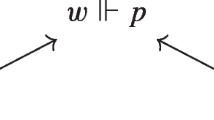Abstract
This paper sets out a new way of combining Kripke-complete modal logics: lexicographic product. It discusses some basic properties of the lexicographic product construction and proves axiomatization/completeness results.
Preview
Unable to display preview. Download preview PDF.
Similar content being viewed by others
References
Balbiani, P.: Time representation and temporal reasoning from the perspective of non-standard analysis. In: Brewka, G., Lang, J. (eds.) Eleventh International Conference on Principles of Knowledge Representation and Reasoning. Association for the Advancement of Artificial Intelligence, pp. 695–704 (2008)
Balbiani, P.: Axiomatization and completeness of lexicographic products of modal logics (long version). Research Report IRIT/RR–2009-20–FR+ of the Institut de recherche en informatique de Toulouse (2009)
Balbiani, P.: Lexicographic products of modal logics with linear frames (to appear)
Blackburn, P., de Rijke, M., Venema, Y.: Modal Logic. Cambridge University Press, Cambridge (2001)
Van Ditmarsch, H., van der Hoek, W., Kooi, B.: Dynamic Epistemic Logic. Springer, Heidelberg (2007)
Euzenat, J., Montanari, A.: Time granularity. In: Fisher, M., Gabbay, D., Vila, L. (eds.) Handbook of Temporal Reasoning in Artificial Intelligence, pp. 59–118. Elsevier B.V., Amsterdam (2005)
Fagin, R., Halpern, J., Moses, Y., Vardi, M.: Reasoning About Knowledge. MIT Press, Cambridge (1995)
Fine, K.: The logics containing S4.3. Zeitschrift für mathematische Logik und Grundlagen der Mathematik 17, 371–376 (1971)
Gabbay, D., Kurucz, A., Wolter, F., Zakharyaschev, M.: Many-Dimensional Modal Logics: Theory and Applications. Elsevier B.V., Amsterdam (2003)
Gabbay, D., Shehtman, V.: Products of modal logics, part 1. Logic Journal of the IGPL 6, 73–146 (1998)
Hemaspaandra, E.: The price of universality. Notre Dame Journal of Formal Logic 37, 174–203 (1996)
Kurucz, A.: Combining modal logics. In: Blackburn, P., van Benthem, J., Wolter, F. (eds.) Handbook of Modal Logic, pp. 869–924. Elsevier B.V., Amsterdam (2007)
Ladner, R.: The computational complexity of provability in systems of modal propositional logic. SIAM Journal on Computing 6, 467–480 (1977)
Nagle, M.: The decidability of normal K5 logics. Journal of Symbolic Logic 46, 319–328 (1981)
Nagle, M., Thomason, S.: The extensions of the modal logic K5. Journal of Symbolic Logic 50, 102–109 (1985)
Oztürk, M., Tsoukiàs, A., Vincke, P.: Preference modelling. In: Figueira, J., Greco, S., Ehrgott, M. (eds.) Multiple Criteria Decision Analysis, pp. 27–71. Springer, Heidelberg (2005)
Palanque, P., Paternò, F. (eds.): Formal Methods in Human-Computer Interaction. Springer, Heidelberg (1998)
Wolter, F.: Fusions of modal logics revisited. In: Kracht, M., de Rijke, M., Wansing, H., Zakharyaschev, M. (eds.) Advances in Modal Logic, pp. 361–379. CSLI Publications, Stanford (1998)
Author information
Authors and Affiliations
Editor information
Editors and Affiliations
Rights and permissions
Copyright information
© 2009 Springer-Verlag Berlin Heidelberg
About this paper
Cite this paper
Balbiani, P. (2009). Axiomatization and Completeness of Lexicographic Products of Modal Logics. In: Ghilardi, S., Sebastiani, R. (eds) Frontiers of Combining Systems. FroCoS 2009. Lecture Notes in Computer Science(), vol 5749. Springer, Berlin, Heidelberg. https://doi.org/10.1007/978-3-642-04222-5_10
Download citation
DOI: https://doi.org/10.1007/978-3-642-04222-5_10
Publisher Name: Springer, Berlin, Heidelberg
Print ISBN: 978-3-642-04221-8
Online ISBN: 978-3-642-04222-5
eBook Packages: Computer ScienceComputer Science (R0)



